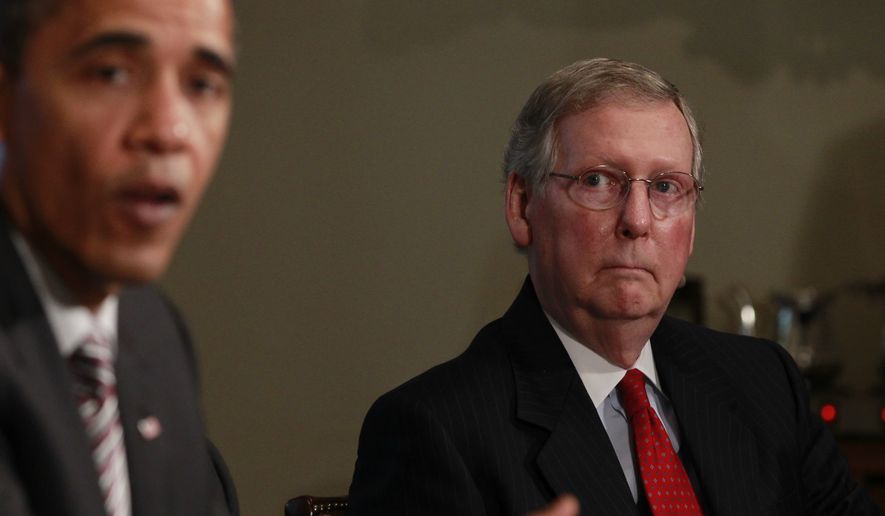The Senate Budget Committee sent formal instructions Friday to committees tasked with leveraging a fast-track budget tool to chalk up a major, if symbolic, GOP victory: the repeal of Obamacare.
The congressional budget for fiscal 2016 instructs chairmen of the Finance and Health committees to each find ways to reduce the deficit by $1 billion over the next decade.
Earlier this week, House budget negotiators sent similar instructions to its committees on Education and the Workforce, Energy and Commerce and Ways and Means.
Many in the GOP think the arcane budget process, known as “reconciliation,” offers their best chance to repeal all or part of the contentious 2010 health law, even though President Obama would veto any measure that attacks his signature achievement.
“I don’t think he’s going to sign anything, frankly,” Senate Majority Leader Mitch McConnell, Kentucky Republican, told “The Hugh Hewitt Show” on Thursday, referring to a less ambitious effort to repeal Obamacare’s medical device tax.
Reconciliation allows the GOP-led Congress to pass legislation on a simple majority vote over objections from Senate Democrats, who normally have the votes to block bills by filibustering.
Democratic majorities used reconciliation to polish off Obamacare in 2010, after the election of Republican Sen. Scott Brown of Massachusetts ruined their filibuster-proof majority.
Today’s GOP leaders want to turn the tables by using Congress’ first unified budget in six years to show they are serious about scrapping the health law.
Committee chairmen from both chambers must report their ideas by July 24, leaving a three-to-four-week window for them to address the potential fallout from a Supreme Court’s decision in King v. Burwell, which is due this month.
Justices are deciding whether the IRS has unlawfully paid Obamacare’s subsidies to customers in 34 states that declined to set up their own health exchanges.
Republicans hope to use the ruling as a bridge to 2017, when a GOP president and majorities in Congress would let them repeal and replace the health overhaul.
“We’re all going to have to look at where we are in the wake of the decision, and we’ll have a plan for the American people if in fact the plaintiff is successful,” Mr. McConnell said.
Congressional Republicans say their use of reconciliation will largely be dictated by whether the justices strike down the subsidies.
Either way, it’s unclear whether the Senate parliamentarian will permit the GOP’s attempt at full Obamacare repeal, as reconciliation provisions must fit into strict budget rules. Most notably, a rule named for former Democratic Sen. Robert Byrd prohibits senators from including extraneous measures that distract from reconciliation’s goal of deficit reduction.
GOP aides said they haven’t given up on full repeal, although they’ve acknowledged that the Byrd rule does place limits on what they can do.
Congressional Democrats have blasted the GOP’s plans as weak and unnecessary, pointing to 16 million Americans who’ve gained coverage under Obamacare. They also say there is no need to forge a back-up plan for the King decision, arguing Congress never intended to treat the states differently and that the justices will see it the same way.
• Tom Howell Jr. can be reached at thowell@washingtontimes.com.




Please read our comment policy before commenting.